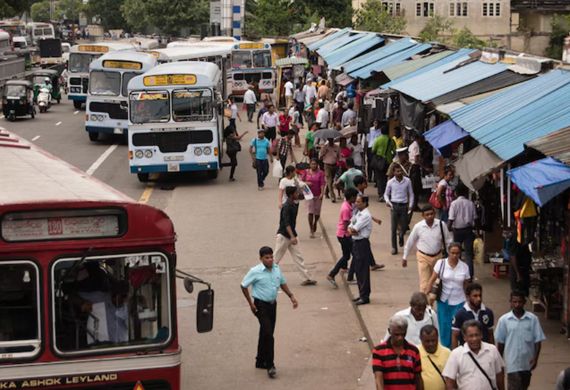
Maharashtra's 'Half Ticket' Scheme Shows Limited Impact on Women's Mobility & Jobs
By: WE Staff | Saturday, 26 July 2025
- Maharashtra's 'half ticket' intercity bus scheme has resulted in moderate gains in women's mobility and work
- The scheme is weaker than full-fare subsidy schemes for intracity buses introduced in other states
- Results are derived from a study "Beyond Free Rides: A Multi-State Assessment of Women's Bus Fare Subsidy Schemes in Urban India"
Maharashtra's 'half ticket' intercity bus fare policy has only led to incremental gains in women's mobility and work when compared to states that provide full fare subsidies for intracity travel, says a new study.
Entitled "Beyond Free Rides: A Multi-State Assessment of Women's Bus Fare Subsidy Schemes in Urban India," the study is the first to perform a cross-state analysis of bus fare subsidies for women. It draws on more than 2,500 surveys, as well as focus group discussions and key informant interviews in 10 Delhi, Karnataka, Kerala, West Bengal, and Maharashtra cities.
In Maharashtra's three largest cities—Mumbai, Pune, and Nagpur—42 percent of the surveyed women indicated no difference in travel behavior after the Mahila Samman Yojana subsidy was introduced. Just 10 percent reported that they could travel farther after the introduction of the scheme. The opposite was true in full-fare subsidy cities such as Delhi, Bengaluru, and Hubballi-Dharwad, where 32 percent of the women indicated that they could travel farther.
In addition, more than 25 percent of women in cities with full subsidy switched to using buses after fares were removed. On average, 26 percent of women in all cities researched felt safer on buses once such schemes were in place.
The study has been carried out by Nikore Associates for the Sustainable Mobility Network, in collaboration with Parisar and the Waatavaran Foundation.
Speaking about the findings, Ranjit Gadgil, Programme Director, Parisar, said,
"Subsidies for intercity travel are of little assistance to daily commuting requirements such as work, caregiving, or shopping. What are required are subsidies for regular city routes. Recent increases in fares in Pune and Mumbai and consequent decline in ridership illustrate the paramount importance of affordable fares to public transport accessibility. In addition, the lack of gender data makes it more difficult to evaluate policy impact on women."
Mitali Nikore, Founder and Chief Economist at Nikore Associates, had this to say,
"Maharashtra's half measures on some routes are a start. But extending support to daily city-level travel could bring much larger economic dividends—provided we tackle challenges also around the financial viability of State Transport Undertakings (STUs), fleet size, gender sensitivity of frontline transport personnel, and accessible urban infrastructure."
Bhagwan Kesbhat, CEO of the Waatavaran Foundation, highlighted the wider importance:
"Fare-free bus schemes do more than enhance journey choice. They enable women to work more regularly, access healthcare, and save for education. A small change in policy can have far-reaching social benefit."
Most Viewed
- 1 Women's Health Startup HerMD Closing Doors Amid Industry Challenges
- 2 5 Famous Women in Indian Armed Forces
- 3 Saudi Women No longer Require Male Permission for Clothing Choices, says Prince MbS
- 4 Kolkata Medtech Startup Innovodigm Raises Rs 5.5 Crore Seed Funding Led by IAN Group
- 5 Yamunanagar's Kashish Kalra Honoured after Securing 111th Rank in UPSC Civil Services Exam
- 6 Madurai Appoints Its First Woman Corporation Head
- 7 IAS Vijayalakshmi Bidari Appointed as the new Nagpur Divisional Commissioner
- 8 American Entrepreneur Lucy Guo Overtakes T Swift to become Youngest Female Billionaire
- 9 ICC Women's World Cup 2025 Trophy Showcased at Indore's Holkar Stadium
- 10 Aparna Saxena's Beauty Venture AntiNorm Launches in India
- 11 Vidya Nataraj Co-Founded BlueStone Jewellery & Lifestyle files IPO
- 12 5 Women Freedom Fighters of India
- 13 Dr. G Krishnapriya appointed as CEO for Trichy
- 14 M3M & Sirona Partner to Introduce Menstrual Hygiene Vending Machines in 15 Locations
- 15 Punjab Govt launches SHE Cohort 3.0 Supporting Tech-led Women Startups
- 16 Indian origin Lawyer, Sweena Pannu appointed as the US New Superior Court Judge
- 17 The Aurora Tech Award recognizes 4 Indian Women-led Startups
- 18 Kerala's Republic Day parade featured an all-female tableau
- 19 Manisha Kabbur Becomes Karnataka's First Woman International Karate Coach
- 20 Director K. S. Ravikumar's Daughter Maalica Ravikumar Launches Life Coaching Company 'Evergrowth Academy' for Women
- 21 Leezu's Raises Pre-Seed Funding to Accelerate Growth in Sexual Wellness Industry
- 22 Sattu: Super-easy summer drink for PCOS gut healing
- 23 Swathi Nelabhatla creates Sitha App, India's First Women-Exclusive Gig Platform
- 24 7 Timeless Female Kathak Dancers & their Iconic Legacies
- 25 Meet 7 Iconic Women Architects of Modern India & their Most Impactful Work
- 26 This Woman-led Insuretech Startup is Helping Bridge the Education Financing Gap in India
- 27 Women Leaders Share Lessons Learnt from India Women's WC Win
- 28 5 Enterprising Women Founders Powering Singapore's Tech & Innovation Landscape
- 29 4 Women. 4 Stories. One Vision for Smarter, Stronger Healthcare
- 30 Global Gender Gap Narrows to 68.8%, But Full Equality 123 Years Away: WEF Report 2025
- 31 Changemakers: 7 Women Entrepreneurs Taking the Make in India Movement Forward
- 32 Meet Lucy Guo, The Youngest Self-Made Female Billionaire Disrupting Tech
- 33 How Women are Driving India's Festive Online Shopping Surge






